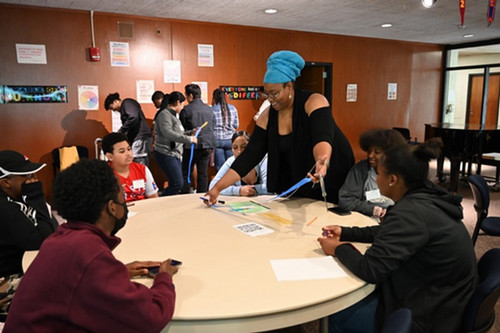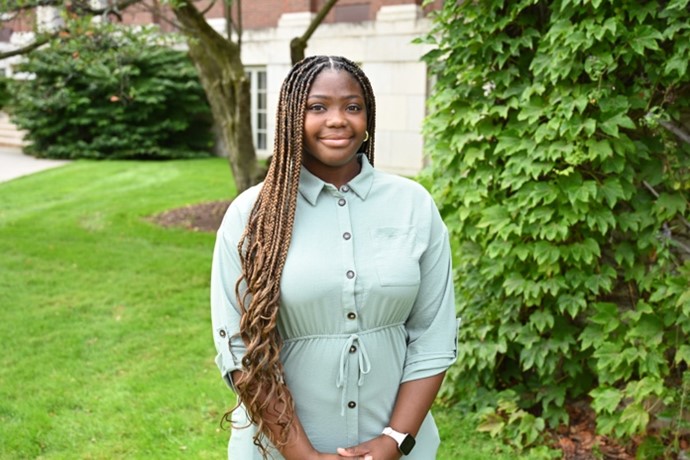2024, A Year of Deadlines and Decisions for College Bound High School Seniors

“When I started to get college acceptance letters through the mail or via Gmail, I was kind of sad because it meant it was time for me to become an adult and grow up. But it was also an amazing feeling because I’ve finally achieved what I’ve been working so hard for, and I am now able to start a new chapter in my life,” says Kierra Dixon, a senior at Wilson High School. Dixon has been a part of the Kearns Center’s Upward Bound program for three years, along with Kiara Ridgeway. "When I was accepted into colleges I was flabbergasted, especially getting into desired colleges,” said Ridgeway who has worked alongside Kearns Center Academic Coach Aye Wathy Myat, who is stationed at Wilson High School and has helped her along the way.
The Kearns Center’s Pre-College Programs team is comprised of six academic coaches who are experts in financial aid and literacy as well as the college admissions process. The coaches are embedded in four different schools within the Rochester City School District and work to support low income and first-gen students graduate from high school on time, and then enroll in college.
But the college application process is not just about hitting the submit button and waiting for acceptances; it’s a long process that can be filled with confusion, fear, and concern about the cost, especially for high schoolers who are low income, or who will be the first in their family to go to college. “The College application process is filled with barriers. That is often the elephant in the room,” says Jerri-Ann Cadet, assistant director for pre-college programs at the Kearns Center at the University of Rochester. “As a team trained to serve First-Gen Students we address that elephant from the start. Students feel at ease when we acknowledge that we know they will have to do a lot, but we frame that truthfully by reminding them that the process is not nearly as intense as acquiring a 4-year college degree.”
Cadet says it is important to provide information and support to students, so they have the tools necessary to complete the college application process. And one way to do that she says, is to divide up the pieces of the application pie. From navigating college admissions websites, to writing personal statements, to applying for financial aid, Cadet says that each piece of the pie is so important. “In the end, we know that it can take a great deal of stamina for students. It can last for months, and follow-through is important, so we help them manage deadlines, create systems for them to keep track of their logins and progress. We also help them to communicate to their parents, teachers, counselors, and guardians as well - until the job is done,” says Cadet.

The Pre-College Programs team also runs two college prep centers, one at East High School and one at the Franklin school campus. Academic Coach for Pre-College Programs, Serenity Lovett is stationed at the Franklin campus working to help students achieve their dreams every day. “I always use the analogy [with students] of building a staircase to their goals.” Lovett says she uses that analogy to help students visualize their path, to see themselves at the bottom of the staircase and their goals at the top. “My job is to help them fill in the rest of the steps. Whether the goal is to be a nurse, a vet, or undecided, we walk them through the steps to get there and give them real life exposure to people in those positions so they can visualize themselves. In our college prep centers students are able to aspire without limits and be supported while doing so.”
Aspiring without limits doesn’t happen without its fair share of hard work. Lovett says she reminds students that the quality of their work will always outweigh quantity when it comes to applying to college. “It may be tempting to apply to 15 colleges, but it is more time and stress than it needs to be. Instead, students should opt for five to eight colleges that they are really interested in and offer what they want/need,” says Lovett. Cadet agrees and says it’s important for students to put in the work to get the reward. “Overall, we want the students to find the right colleges for them personally. This isn't like homework where you can copy and paste from a friend. You have to do the work in this process for yourself so that you end of at an institution that is the right fit for you academically, financially, socially etc. In the end, applying to schools that you actually are interested in, is a great motivator to complete the process, and makes the writing processes a bit easier,” says Cadet.
Finding that right fit is something that the Class of 2024 will be thinking a lot about in the coming months, as many colleges and universities require students to reply with their decision by May 1. Kiara Ridgeway is excited about what comes next and has some advice for students who will be applying to colleges in the future, “My advice to you is to put yourself out there doing the things you are interested in, join clubs, and apply for scholarships. Apply for what YOU want only!"
